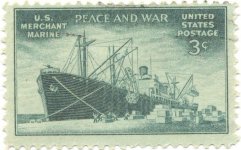I read a great article sent to me by a friend in the US that was published in the Ocala Star-Banner about a Merchant Marine Veteran who served since his youth and was here in Panama when my father was stationed here and I was born in the Canal Zone.
93-year-old Albert Wilder talks about his days as a Merchant Marine Veteran from his home office Sunday, July 31, in Ocala.
In 1936, at age 19, Albert Wilder “didn’t want to sit in an office all the time,” so he signed on as a crewman on a freighter to South America along with his identical twin, Arthur.
It was the maiden voyage of seafaring careers for the Wilder boys, who were born in Dorchester, Mass.
The next voyage for the brothers was in 1937, on the SSS Nantucket, a three-masted Merchant Marine schooling ship, where they had to learn more than 100 rigging lines and climb the tall masts on the 165-foot-long ship.
The sailors also got matching anchor tattoos on their right forearms, to the chagrin of their mother, who saw a newspaper photo of them arriving at a dock.
Albert’s Merchant Marine career lasted from 1939 to 1950 and included hauling critical cargo on Liberty ships to Russia under the Lend Lease World War II program.
Liberty ships, 441 feet long, were quickly produced in modular sections. The lightly armed cargo ships were regularly dogged by German submarines and subject to attack by enemy aircraft as crews risked their lives to deliver critical war supplies needed by the U.S. and allies in the European and Pacific theaters during World War II.
“The enemy knew if we got the tanks and materials over there, we would get stronger,” said Albert, now 93, as he pointed out pictures of the WW II vessels in his northeast Ocala home, where he lives with his third wife, Aura.
In 1942, Albert set sail on the Liberty ship Daniel Morgan as part of the ill-fated convoy PQ-17. The convoy’s heavily armed escort warships were called off when there was concern the German battleship von Tirpitz might attack, leaving the cargo ships as “sitting ducks.”
He had to abandon ship on July 5 after two Nazi dive bombers released six torpedoes and the ship’s steering was knocked out of commission. The crew reboarded, but a fire in the engine room forced them to abandon ship again.
He said a German U-boat surfaced nearby as the ship sank, and the enemy captain questioned his captain about what they were carrying.
“Our captain said ‘hospital supplies,’ and told the U-boat commander he had a bad compass [and could not get to land for safety] and the U-boat commander said to follow him.”
The survivors eventually made it to islands near Archangel, Russia.
Arthur served on the Liberty ship William Hooper, which sank July 4, 1942.
“For four days, neither Arthur nor I knew what had happened to each other,” Albert said. “We later met up and toured several Russia hospitals playing music, myself on guitar and my brother on mandolin, for wounded soldiers.”
•••
Albert served in the Navy from 1950 to 1952 and attained the rank of lieutenant commander. In 1952, he began a career that lasted until 1982 as a ship’s pilot for the Panama Canal locks, taking ships like the 950-foot-long freighter Tokyo Bay through the locks with only a few feet to spare on either side.
He said his 2,554 traverses of the canal included many with his brother, who worked in the Canal Zone for years, with the brothers often at opposite ends of the same ship.
“I’d tell the operator in a control room at the center, ‘I’m so busy I’m at both ends,’ ” Albert said with a chuckle.
He and his first wife, Rosemary, had three daughters and a son, Tom, who is chief of staff with the Marion County Sheriff’s Office. Tom was born was in the Canal Zone; his sisters still live in Panama.
“Some of the ships’ captains had a hard time with it, but my dad had complete control of the ship as it traversed the canal,” Tom Wilder said.
He is president of the Panama Canal Society, a group of former Canal Zone residents who meet annually in Florida.
Albert’s experiences as a ship’s pilot at the Panama Canal were selected for the University of Florida’s Samuel Proctor Oral History Program. The program’s director, Paul Ortiz, said Wilder’s “significant” accounts of experiences, including “moving multi-million dollar” cargoes through the locks, were added “to preserve the history of the American era in the Canal Zone.”
•••
After moving to the Ocala area in 1984, Albert thought it might be “fun” to captain a glass-bottom boat at Silver Springs. But holding a lifetime Master Captain license from the Coast Guard made him “overqualified.”
After satisfying the proper paperwork, he did skipper one of the attraction’s boats for a summer.
Albert still enjoys a daily 20-minute swim and watching baseball. He recently was recognized by the Marion County Veteran’s Council for his “heroic service and dedication to his country,” said Marion County Veterans Services director Jeffery Askew.
Arthur, who has Alzheimer’s disease, is in a nursing facility in South Florida.
Albert, a former CEO of the American Merchant Marine Veterans group in Ocala, said members of the Merchant Marine were not included in veteran’s benefits until the 1980s, and even then still lacked benefits such as the G.I. Bill.
Morris Harvey, of Ocala, the current national president of the American Merchant Marine Veterans, called Wilder a “dedicated” veteran.
“Some of those Liberty ships had fake guns or no guns. He is a real hero,” Harvey said.
When asked about his most exciting moment, Albert replied: “That’s tomorrow; it hasn’t happened yet.”

